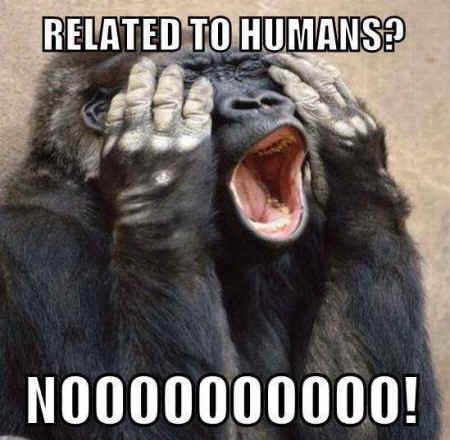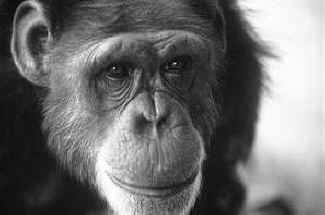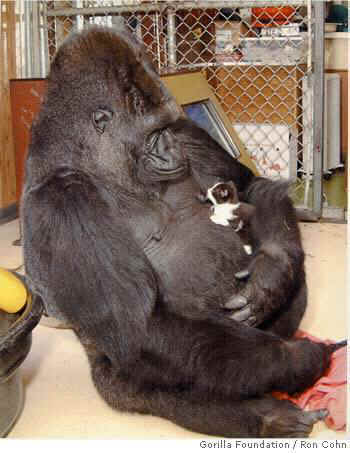
Humans: Uniquely Unique or Chronic Rationalizers?
An Animal Rights Article from All-Creatures.org
FROM
Animals in the Wild
October 2015
It seems, while our technological advancements and mechanical understandings may be growing rapidly, if not hastily, our acceptance of non-human awareness, and in fact, our own moral evolution, is still crawling at a snail’s pace. As it is for global warming, denialism about animal awareness is an agenda-driven form of rationalization.

As far as the rights and welfare of all other species of animals are concerned, human arrogance—narcissistic notions of human supremacy over nonhumans—is the root of all evil.
Ever since my youngest days, I’ve always instinctively known that the “us and them” cultural given was wrong-headed, and that having two sets of laws, one for our species and one for all others, is absurd at best.
This has been backed up by much that I have read over the years. In an effort to counter centuries of long-accepted dogma intended to instill anthropocentric attitudes, philosophers like Peter Singer, with his Animal Liberation, and scientists like Jared Diamond and Richard Leaky, in The Third Chimpanzee and The Sixth Extinction respectively, have devoted sections of their books to debunk outdated beliefs of human preeminence and superiority.
To further put humans in their rightful place, the following is something I happened on last night in the late John A. Livingston’s 1994 book, Rogue Primate:
“Few exercises in rationalization have involved quite so much intellectual pretzel-bending as the task of demonstrating absolute human uniqueness. Our obsession with this is revealing. It’s not enough that every individual, and every species, is a unique, one-time-only, event. Fanatical humanism demands more. All species are unique, we may acknowledge, but one species is uniquely unique. Which reveals a good deal more than bizarre English usage.
“Thanks to studies in ethology and behavioral ecology, the religion of human uniqueness has sustained a series of notable setbacks in our lifetime. We have had to abandon a substantial list of ‘unique attributes’: tool using, tool making, language, tradition and culture, abstraction, teaching and learning, cooperating and strategizing, and others, less inflammatory, such as caring and compassion. There’s not a lot left. But the ultimate fallback position, the central jewel in the human imperial crown, had always been self-awareness. Then along came little Washoe.

“Washoe, a chimpanzee, was raised by humans, Allen and Beatrice Gardner. She became famous as the first non-human being to learn the hand-sign language of the deaf and mute, a mode of communication seen by the Gardners as more useful to a chimpanzee (because of its anatomy) than human sounds. While still very young she became extraordinarily adept at signing, which of itself generated concern in some quarters. An ape was not only ‘speaking,’ but also, apparently carrying on conversations with her human mentors. But Washoe’s historic bombshell was kept in abeyance for a time. She had been supplied with various toys and other miscellaneous items, and had also become used to all manner of human household hardware, such as mirrors. One day, while she was looking into a mirror, she was asked ‘Who is that?’ ‘Me, Washoe,’ she signed back.
“Washoe was ‘self-aware.’ This was flabbergasting. And for many people it was deeply unsettling. We seem to be witnessing the collapse of the last bastion of human uniqueness. Something had to done about Washoe. Human brows furrowed in thought. Then came the answer. Of course! How blindingly obvious! Washoe was not aware that she was self-aware. One can almost feel the collective sigh of relief. We could not know this, of course, but it was fundamental to the shoring-up of the collective self-esteem that we asserted. Now if it were somehow demonstrated that a non-human animal was, in fact, aware of its self-awareness, then no doubt, the claim would be made that it was not, like us, aware of its awareness of its self-awareness. This could go on forever, and probably will.
“The problem of self-awareness (or rather, the problem of our unrepentant claim, in spite of Washoe and others, that beings who are not human do not have it) confuses a number of issues pertaining to the human treatment of other animals. It appears consistently in defense of vivisection, for example. ‘Sentience’ is much used as a synonym for self-awareness, or, sometimes, consciousness. Non-human animals are not sentient (consciously self-aware); therefore, it is ethically permissible to do as we please with them. Such reasoning is mystifying. Even if the living, captive individual beings (both wild and domesticated) upon whom the vivisectors visit their incomprehensible acts were not self-aware, how would that justify cruelty? No one denies that they have central nervous systems (that is one of the important reasons they are used) that they feel pain (another reason), that they entertain fear (still another). Fear without self-awareness is gibberish.
“Vivisection has its own strange ethical code, but it is not the only such structure to depend ultimately on the concept of self. Ethics rests on moral philosophy. Moral philosophy rests primarily on the individual. Presumably the concept of the individual rests ultimately on the concept of self. It used to be generally assumed that non-human beings were incapable of thinking or behaving ethically because, among other limitations, they lack the concept of self. That was pre-Washoe.
Many humanists attempt to handle the problem of self-identity in a chimpanzee by asserting that the animal lacks the capacity for reason, and therefore could never conceive of moral or ethical rights and obligations. That the animal lacks reason could be debated (there is ample evidence in many species of problem solving, which could only be conceptual). What animals very probably do lack is the power of rationalization, which would appear to be a uniquely human attribute.”
It seems, while our technological advancements and mechanical understandings may be growing rapidly, if not hastily, our acceptance of non-human awareness, and in fact, our own moral evolution, is still crawling at a snail’s pace. As it is for global warming, denialism about animal awareness is an agenda-driven form of rationalization. Koko the Gorilla seems to smile as she looks at a kitten. Koko has had many pets during her years at the Gorilla Foundation. Koko is shown in 2000 holding a kitten, one of many pets the gorilla has had in her years at the Gorilla Foundation. Koko the gorilla is claimed to have a nipple fetish.

Return to Animal Rights Articles







